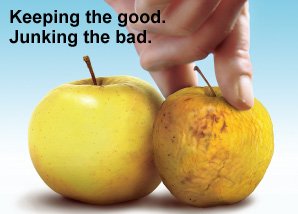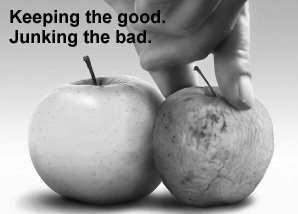Strategies for a financial spring clean
Conquer your financial paperwork:

With the new year, you may be thinking of a spring clean for your home to get rid of hidden dust bunnies, cobwebs and clutter. While it is common to have a home spring clean, many have not considered an annual financial spring clean, which may be just as essential to the overall management of your finances.
The goal of your financial spring clean is to keep your financial information organised, accessible and workable. It may also be an opportunity to review your finances and keep them up to date. Just as you may notice during a home spring clean that you need new curtains (or need to wash the old ones) to brighten up your home, your finances may need some polishing in order to shine as well.
“Operation: Financial Spring Clean” may seem like a big task, so where do you start? Consider the 3-S – a simple way to keep your financial information under control.
Start from the first “S”, which is to “Shred” and work your way towards “Survey”. Here is what you may need:
- A paper shredder
- Ring binder files or box files (as many as you need)
- A fireproof safe or bank safe deposit box (good to have but optional if you have other means of securing your documents in the event of fire)
STEP 1: SHRED
Over the year, you may have knowingly or unconsciously fed a growing mountain of paperwork – bills, receipts, statements, prospectuses and reports. You may need some of them for your tax return but chances are, there are lots of bits and pieces which you may no longer need. First, carefully look through your documents and consider whether you need to keep them (eg. for tax or accounting purposes) then discard what is unnecessary. However, do not just throw a piece of financial information into the trash. To shield your financial identity from prying eyes or identity thieves, it could be best that you shred them.

Bank statements
Old bank statements no longer accurately reflect your financial status. If you are applying for a loan or credit card, banks or financial institutions may require bank statements anywhere from one to 6 months. Beyond that, it is usually unnecessary.

ATM withdrawal slips, deposit slips and any banking transaction slips
Once the transaction is reflected in your bank statement (hard copy or online), you may consider shredding it if there is no specific need for it.

Credit card statements
You may consider disposing of credit card statements once you have verified it with your credit card transaction slip, unless you need it for tax or business purposes, or for proof of purchase of a specific item.

Investment transaction confirmations
After you have made an investment, you will usually receive a written confirmation. You may keep this confirmation until it is reflected. in your monthly statement. As for monthly statements, you may choose to shred them as new ones arrive but keep annual statements for your tax purposes.
SMART TIP!
You may consider reducing your paperwork by opting for an electronic version of your bank statements. With HSBC’s e-statements, you will be able to access and download up to 15 months of statements from the time your sign up for it. No more filing of paperwork or misplacement of your statements.
STEP 2: STASH
Keeping some paperwork is unavoidable. It may at times, save you unnecessary expenditure (such as making use of the warranty for your washing machine repairs, provided it is still under warranty). The trick to stashing is to create a system that works for you.
Use what is most convenient and appealing to you to file away your documents. You may consider filing your documents in a box file (ring-binders or magazine holders may also be good options) according to categories such as “Vehicles” or “Insurance” and keep all relevant documents, in the specific file. Designate a permanent spot on your cabinet and place all your files together. This may save you many minutes of scurrying through different areas at home to locate the document you need1.
Consider stashing the following:
Appliance manuals and warranties
Hang on to these as long as you own the item. If something goes wrong, you will be glad to have them to take up the warranty or contact a repair man. On the other hand, if you no longer have the item, consider tossing out the warranty and manual.
Vehicle registration card
You will need to renew your road tax every year, so keep documents for your vehicles in a file of their own.
Loan and mortgage documents
Your loan documents and annual statements go into a file of its own. If you have refinanced your home, make sure that you keep the most up-to-date mortgage documents in this file.
Insurance policies
Store your home owners policy, auto insurance, disability and life insurance policies and declaration pages for as long as the policies remain in force. You may consider shredding expired policies.
Tax records
By law, you need to retain your tax records for 7 years, from the end of the year of assessment, in the event of an audit (e.g. You will need to keep 2011 tax records until year 31 December 20182. You will need to keep the return you have filed, statements of income and expenditure, invoices, vouchers, receipts and such other documents that are necessary to verify the particulars in the tax return. You may wish to use a dedicated file for each year of assessment with tabs for statements, receipts, etc.1
What to stash in a secure place (ie. a fireproof safe or safe deposit box):
- Birth/Death certificates
- Marriage Licenses
- Copies of wills and trusts
- Copies of burial deeds and plots
- House deeds
- Safe-deposit box inventory
(Source: Adapted from CBS Money Watch, “Financial spring cleaning: Time to purge” 21 March 2012)
STEP 3 : SURVEY
This last step is to conduct a survey on your finances and determine whether they are performing on-par with your goals and expectations. The goals are to spot areas clogging your financial growth, ascertain areas that may need greater financial support, and consider potential investments. The questions below are designed to prompt you to reflect on your financial condition, plan for expected changes and consider possible avenues to grow your wealth.

What to survey:
![]()
What are some of the significant changes in your work and/or personal life in the last 12 months?
This may include a new jobretirement.html, new home, new child, marriage, opening/closing of a business, child starting school.
![]()
What are some of the planned/predictable changes in your work and/or personal life that will take place in the next 12 months?
You may be embarking on life changes that may require you to buy a new home, start an education plan, and re-evaluate your risk profile.
![]()
Is your life insurance plans supporting your coverage needs?
You may wish to conduct a thorough review of your insurance needs with your insurance advisor if there are changes to your coverage needs.
![]()
Is the performance of your retirement plan growing at a rate that will support the retirement you are working for?
Should you be putting in more funds into plan? What other investments would fast-track the growth of your retirement funds?
![]()
Are your savings and investments aligned to your investment goals?
Do you need to diversify your portfolio, such as, including foreign currency investment or bonds into your portfolio?
![]()
Is your emergency savings plan in place?
Have you met your savings goals since your emergency savings fund was established? You may wish to re-evaluate how much you truly need in your emergency fund. Revisit your budget and decide if you want to maintain your current levels or make changes.
![]()
Have you considered the impact taxes will have on your investment goals?
Are there tax changes that you need to understand and its possible impact on your investments? (ie. Property Gains Tax). Discuss these tax regulations and their impact with your accountant or tax advisor.
![]()
If you are a business owner, are you clear on how your business interlinks with your personal finances?
Relook at how your business has performed historically and where the business stands today. Can you predict where the business will be heading in the next 12 months? Having a clear sight of this can then help answer questions such as “How will the income from my business affect my lifestyle?”, “When would I have access to this money?” as well as “Where is it going to come from?3
![]()
Are there new policies, plans, and products that are available that could match your investment or savings goals?
Stay updated with the market performances and economic updates through HSBC’s Market Outlook as well as FOREX updates through HSBC’s Foreign Currency Trading Market News. Have a chat with your Relationship Manager today on how you can further enhance your financial portfolio.
(Source: Adapted from New York Life.com, “Manage Your Finances for a New Year: An Annual Review”, 13 December 2010”)
If you have completed the 3-S, it means that you have at least created a system that keeps your financial information organised, uncluttered and up to date. While the first year of a financial spring clean may leave you flustered as you may have to contend with a large number of paperwork, it does get easier if you keep at it year after year. Do consider having a financial spring clean annually, to keep your finances spic-and-span and to ensure that they are still moving in the same direction as your personal life goals.
Source:
1. USNews Money, “50 Ways to Improve Your Finances in 2012”, 21 December 2011.
2. Malaysia Income Tax Act, 1967, Part V – Returns.
3. http://financialplanning.hsbc.co.uk/article/11/where-to-start.
January 2013


 LIKE THIS ARTICLE?
LIKE THIS ARTICLE?





















